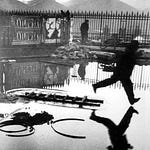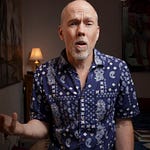“All models are wrong, some are useful.” — George Box
To be fair, I was wearing a pink bathrobe and eating a piece of gluten-free cherry pie in someone else’s house. It was New Year’s Eve. I told a stranger I was studying physics.
His face lit up. He said, “I’m a big fan of Deepak Chopra.”
This kind of response used to annoy me.
It still does. But not as much, and wondering why it annoyed me taught me something about people, some of whom I love.
“Words matter.” — Barack Obama
Deepak Chopra is not the only person who has endowed the word “quantum” with spiritual glitter. Still, he’s been the most effective. My new friend could not remember the name of the actual physicist from the podcast they were telling me about, but they remembered that Deepak was there. Most people are not physicists, so they hear the word “physics” and connect it to the closest thing they’re familiar with — popular science articles and new-age-spirituality-self-help-motivational things — which for decades have been about or inspired by quantum physics, quantum uncertainty, and the certainty of book sales with the word “quantum” in them.
I am a writer, physics student, and ethical human interested in the rightness and usefulness of words. I want to understand you, and I want you to understand me. Let me define what physicists mean when they say “quantum,” as in “quantum physics.”
“The game I play is an interesting one. It’s imagination in a tight straitjacket, which is this: that it has to agree with the known laws of physics.” — Richard Feynman
A quantum is a discrete unit of energy. There seem never to be .75 photons of light. There is one, or there isn’t, or, famously, there can be one and not be one simultaneously until we observe it.
That’s it. Energy comes in discrete units called quanta. Sometimes, they’re called particles. Everybody’s next question, even the physicists who created quantum theory, is, does “until we observe it” mean that our consciousness affects the photon?
No. A camera sensor can observe the photon. The solar cell on a calculator can observe it. We could check our data and observe what the photon’s position was a moment ago, back when we were unaware of it.
Of course, quantum mechanics is much more complicated than that, and if you have ten years to study it, you should. If you don’t, I get it. No one can care about everything. We have to do the laundry.
“I’m a magnet for all the crackpots in the world, but they are of interest to me, too. A favorite pastime of mine is to reconstruct their thinking processes.” — Albert Einstein
Let’s get back to Deepak Chopra. I’m sure he’s a nice guy, or he isn’t, until I observe him. His latest book, Quantum Body, states:
“Very little about your real body is talked about in medical textbooks… Your real body is a quantum creation, it arises from the quantum field that created the universe…”
Is he saying doctors don’t understand that your body obeys the laws of quantum mechanics? That seems unlikely. Doctors use X-rays, MRI machines, PET scans, and many other technologies designed to take advantage of the quantum mechanical properties of your body.
Also, which quantum field created the universe? Was it the electron field? The Higgs field? There is a different quantum field for every particle. So, “the” quantum field doesn’t make any literal sense.
Speaking of fields, to be generous, Deepak Chopra is not in the field of physics. One of his co-authors, Jack Tuszyński, is a trained physicist but works as an oncologist. The other is Brian Fertig, an endocrinologist. I’m pretty sure that Jack and Brian aren’t the only doctors who understand that bodies obey the laws of quantum mechanics. If you’re a doctor, leave a comment and let me know if this is news to you.
The authors go on to discuss the difference between the body we think we have and the book's namesake, the quantum body. They assert that the quantum body “doesn’t get sick or grow old.” I just had the flu. Are they saying that wasn’t real? Or are they saying electrons don’t get sick?
Are they using the word “quantum” as a metaphor or a metonym? “Russia denied any wrongdoing” is an example of metonymy; “Russia” is a stand-in for something else — in this case, an official spokesperson.
A friend of mine, a neuroscientist and researcher, said, “Physics is the soul of the sciences.” “Soul” is not a scientific word. One could even argue that it’s misleading. However, it expresses something that would be lost if the sentence was paraphrased as “the work done on the principles and theories of physics underlies the foundations of all the sciences.”
The word “soul” was clear to me as a metaphor, meaning something like “a thing that, whether visible or not, underlies these other things.” Metaphor is an ancient technology that did what it was designed to do; it compressed the information. Moreover, it was well chosen because it gave me an idea of how my friend feels about physics. “Soul” implies something eternal and immutable and conveys the awe of profound mysteries.
So, I’m trying to understand what “quantum” means to Deepak Chopra. If we replace it with “spiritual,” we get, “Your real body is a spiritual creation; it arises from the spiritual field that created the universe…”
That makes a lot more sense to me. It jibes with the vibe of his writing. The book would be called “Spiritual Body.” Let’s try it with more Deepak Chopra quotes.
“Spiritual healing moves away from external, high-technology methods…” That works.
“Viewing your body from the perspective of spiritual physics opens up new modes of understanding… human beings can reverse their aging.” I know that time never literally goes backward. So, when I put the word “spiritual” in here, I don’t expect anything to make literal sense, and I’m not disappointed.
It seems like Chopra is using “quantum” as a mystical metonym to bridge spirituality and science. To be clear, he says a lot of helpful things about eating well, exercising, and managing stress. But this attempted bridge between the spiritual and scientific worlds is the thing that annoys me.
“Then the medium went skirmishing through the papers for the corresponding name. And that old sport knew his card by the back! When the medium came to it, after picking up fifty others, he rapped! A committeeman unfolded the paper and it was the right one. I sent for it and got it. It was all right. However, I suppose all those Democrats are on sociable terms with the devil.” — Mark Twain, The Spiritual Seance
God isn’t a good theory to describe electromagnetism or gravity; science won’t mend your broken heart. It’s like trying to design a hammer that’s also a paper towel. But this has happened since science was born.
Science exploded in the West during the Victorian era. In fact, the term “scientist” was coined in the 1830s to describe a newly lucrative field that was predominantly, for millennia until then, a prestigious hobby. This was the age of Darwin and Maxwell. The fields of optics, biology, thermodynamics, and more grew at an unprecedented rate that awakened an interest not only in science but also in Spiritualism. As much as hucksters and snake oil come to mind, even Marie and Pierre Curie believed that science might finally prove the existence of a spiritual realm.
Unfortunately, misuse of the language of science was also used to cause irreparable harm and to gain widespread support for terrible ideas. Eugenics assured white people that they were, as they suspected, the best people. Charles Davenport, a professor of zoology at the University of Chicago, became the head of a government agency with this kind of scientific-sounding hogwash:
“One of the most striking characteristics of sea–lust is that it is wholly a male character … so the appeal of the sea develops under the secretion of the germ gland in the boy. It is theoretically possible that some mothers are heterozygous for love of the sea, so that when married to a thalassophilic man half of their children will show sea-lust and half will not.”
I wouldn’t say that Deepak Chopra is as dangerous as Davenport. Still, there are people — you know who they are — who use the current popular science language to convince people that vaccines are more dangerous than diseases and that they can cure themselves of cancer with supplements and buckwheat enemas. Throw the word “quantum” in there, and you’ve compressed all the wonder and achievement of modern science into a marketing slogan.
It’s not all bad news. The Victorians never found the spirit boson, but surely communicating with dead relatives was helpful for some, whether or not it was a factual enterprise.
The current milieu of quantum woo reflects that same fascination with the unknown that will never be satisfied, the blessing and curse of human curiosity responsible for the device that brings you these words. Spirituality and science can inspire each other and work their magic in turn. Science is about facts as much as possible, but facts and truth are both valuable — and only slightly overlapping — concepts.
The founder of what we now call the Big Bang theory was a Catholic priest, Georges Lemaître. When Pope Pius XII proclaimed that Lemaître’s theory was a scientific validation of the Catholic faith, Lemaître responded very clearly and carefully.
“As far as I can see, such a theory remains entirely outside any metaphysical or religious question. It leaves the materialist free to deny any transcendental Being… For the believer, it removes any attempt at familiarity with God… It is consonant with Isaiah speaking of the hidden God, hidden even in the beginning of the universe.”
Science doesn’t require you to profess your faith in the one true meaning of quantum physics. The great thing about science is there isn’t one. Prove that all science is wrong; you’ll get a royal flush of Nobel Prizes. If we keep our minds open to new ideas, science and spirituality will inspire each other as they have for centuries.
"We are not an emergent property of a mechanical universe but the seasonal activity of a living cosmos." — Deepak Chopra
As far as we can tell, everything is quantum mechanical. There’s nothing supernatural or unnatural about quantum physics. On the contrary, it’s the most complete and accurate description of nature we’ve ever had. It’s not some other world unseen to us. It is the world. And that is what makes it magical to me.
Deepak is not a physicist and is not bound by the same conceptual straitjacket as Feynman or Lemaître. My generous assessment is that he is a spiritual poet and trickster. He’s trying to get you to think differently, and that’s fun. So have fun. Take part in “the seasonal activity of a living cosmos,” whatever that means to you. Paint a gourd in your soul, and take your medicine like your doctor told you.
Bibliography
Box, George. Science and Statistics. American Statistical Association. https://www-sop.inria.fr/members/Ian.Jermyn/philosophy/writings/Boxonmaths.pdf
This is a common paraphrase that appears nowhere in the text as such. A direct quote might have been, “Since all models are wrong the scientist must be alert to what is importantly wrong. It is inappropriate to be concerned about mice when there are tigers abroad.” The phrase has been through a ‘folk process’ and is now ubiquitous in the sciences: “All models are wrong, some are useful.”
Cep, Casey. Why Did So Many Victorians Try to Speak with the Dead? The New Yorker. https://www.newyorker.com/magazine/2021/05/31/why-did-so-many-victorians-try-to-speak-with-the-dead
Chopra, Deepak, et al. Quantum Body: The New Science of Living a Longer, Healthier, More Vital Life. Harmony.
Chopra, Deepak, et al. Quantum Healing: Exploring the Frontiers of Mind/Body Medicine. Bantam.
Chopra, Deepak. https://twitter.com/DeepakChopra
Farber, Steven A. U.S. Scientists' Role in the Eugenics Movement (1907–1939): A Contemporary Biologist's Perspective. National Library of Medicine. https://www.ncbi.nlm.nih.gov/pmc/articles/PMC2757926/
Feynman, Richard. Feynman physics lectures. youtu.be/JK0TXcU47Ks?si=iYEnstti5AY41zME
Einstein, Albert. Conversations with Einstein, edited by R.S. Shankland. https://www.scribd.com/document/355885459/Conversations-With-Albert-Einstein-Shankland
Georges Lemaître, Father of the Big Bang. American Museum of Natural History. https://www.amnh.org/learn-teach/curriculum-collections/cosmic-horizons-book/georges-lemaitre-big-bang
Twain, Mark. The Spiritual Seance. Virginia City Territorial Enterprise. http://www.twainquotes.com/18660204t.html















